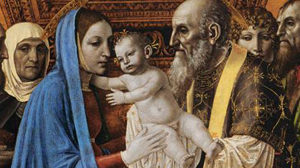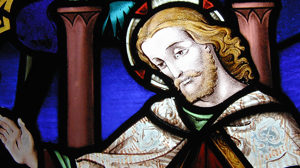Friday After Ash Wednesday
Thursday After Ash Wednesday
Daily Scripture, February 15, 2018
Deuteronomy 30:15-20
Luke 9:22-25
Reflection:
“Whoever loses his life for my sake will save it”
What is the one thing we have in great abundance that God wants? Indeed, God begs us to give this one thing to him because he doesn’t have it. It is our weakness. The Apostle Paul says it so eloquently. “But he said to me, my grace is sufficient for you, for my power is made perfect in weakness” (2 Cor. 12:9).
Yesterday, with the simple ritual of ashes, we began our Lenten journey. The ashes are not a sign of our holiness. Rather, they are a symbol of our weakness. They mean that if we want to follow Jesus, we must die to ourselves, lose our lives, our weakness, in his grace and power. That is the journey of repentance, of metanoia. Lent is the time to change our hearts, our minds – and our direction – in order to follow Christ.
But metanoia isn’t easy. On the contrary, we are rather skilled at disguising our weaknesses as strengths, even as virtues. Aren’t perfectionists virtuous at heart? They’re just trying to make things right, to follow the rules. And when someone breaks a rule, they are ready to correct them, to “improve them.” It’s for their own good. But watch out. When the rule-breaker doesn’t listen, the perfectionist gets angry. Or what’s wrong with someone who wants to love and care for us? Nothing, unless they demand love – and recognition – in return. When they don’t get it, then love becomes manipulative. Ronald Rolheiser says those who demand that kind of love will carry our cross – and then send us the bill.
It is only when we die to ourselves and the ego that disguises our weakness for virtue, only when we lose our lives in the life of Christ that we will be truly strong.
During this Lenten season, we are invited to take up our cross. It is the cross of our weakness. We are called to follow Jesus. It is the way of metanoia, when in grace we in change our direction.
Deacon Manuel Valencia is on the staff at Mater Dolorosa Passionist Retreat Center, Sierra Madre, California.
Ash Wednesday
Daily Scripture, February 12, 2018
Scripture:
Reflection:
During this past week, my family and I have been engrossed in the Olympic Games. Not only have the competitions, medal counts and uniforms caught our attention but also the stories of the athletes. We hear that these athletes have been training since they were very young. Despite trials, hard times, broken bones, and homesickness, they persevered to attain their goal of becoming an Olympic athlete. The stories are truly inspiring.
In today’s first reading, we begin at the start of the Letter of James. Immediately after his greeting, he dives into the importance of trials and perseverance in our faith. “Consider it all joy my brothers and sisters, when you encounter various trials, for you know that the testing of your faith produces perseverance.” James 1:2
We need perseverance to continue to grow in our lives and faith. As everyone knows, we have or will encounter trials often. Whether it be the loss of a job, illness, death of a loved one, or spiritual dryness; all of these trials and more can test our faith.
During these trying times in my life, I have always referred back to the saying “What doesn’t kill you, makes you stronger.” Not particularly poetic, but there is some truth to it. Many of these trials do not kill us, but produce perseverance and endurance within us to run the race and fight the good fight. These trials remind us of the great grace, mercy and love that is bestowed on us by Christ.
From the example of the Olympic athletes, we know that this perseverance is not gained overnight. It is nurtured by a daily commitment to your passion. And in order to grow in our relationship with God, we must have passion for our faith. Making the daily effort to nurture this gift of faith will help to keep up our endurance and keep our eyes focused on Jesus.
So like these athletes, let us work hard towards our goals. “We will run and not grown weary, for our God will be our strength and we will fly like an eagle, we will rise again. We Will Rise Again.” David Haas
Kim Valdez is a former Pastoral Associate at Holy Name Passionist Retreat Center in Houston, Texas.
Daily Scripture, February 2, 2018
Feast of the Presentation of the Lord
Scripture:
Malachi 3:1-4
Hebrews 2:14-18
Luke 2:22-40
Reflection:
In our reading of the Scriptures, especially the Gospels, we probably associate some of the parables, or the infancy narratives, or the account of the events of Holy Week, with our own personal piety and devotion. Some biblical passages resonate in our experience and in our hearts more than others.
Who can read the infancy narratives of the gospel of Luke and not feel the wonder of the shepherds at the birth of a redeemer King? Or who can read the events surrounding the Sermon on the Mount, with its proclamation of the Beatitudes, and not feel challenged to be more loving, patient and forgiving of one’s neighbor? Or who can read the events of the Passion Narratives, and not feel the sorrow of a family experiencing the imminent death of one of them?
For me, the passage of the Presentation of the Child Jesus in the Temple is the clearest and most compelling affirmation of the value of life (yes, you may substitute “pro-life” here) that the Scriptures offer us.
This passage profoundly and reverently gathers together the wisdom of age, the aspirations of a young family, and the religious traditions that give value to the life and days of each member of the scenario.
Jesus is helpless; he is carried in the arms of his father and mother to be presented in the Temple, along with the ritual offering which entitles the parents to bring him home and raise him, that he may “grow in wisdom and age.”
Helpless though he may be, totally dependent on his parents for his survival, he is, nevertheless, the promised and covenanted savior. It is he who, nestled in the womb of his mother, was carried to the house of Elizabeth, and introduced to her unborn child, who is John the Baptist, and who is said to have lept for joy at the pre-natal encounter with Jesus.
Now, in the gospel passage, forty days after his birth, he is brought to the Temple for a ritual that acknowledges that all life comes from God, and all beings belong to the Lord, more than to their parents. Hence, the ritual includes the symbolic “ransom” of the child through the prescribed offering, so that the parents may return with the child to their home.
Surely Mary is re-living all that has happened to her in the past year. The visit from the Angel Gabriel, the fear that Joseph might repudiate her; the validation of her “yes” to God’s in the eventual birth of her child. And Joseph, the stalwart, faith-filled man of honor, who takes Mary as his wife, with only a remembered dream upon which to base his life-long fidelity to his cherished fiancee.
But they are not alone in the temple. Simeon and Ana each have special roles to play in the narrative of the Presentation. Simeon is an old man, but the Holy Spirit was upon him; and he had been promised by God that he would not die until he had welcomed the Savior that all of Israel had anticipated. That moment had arrived, his life was fulfilled in its old age.
Ana, an old woman, a widow, and someone who had spent her widowhood waiting for the Savior of Israel to appear recognizes in the child Jesus the fulfillment of her life’s greatest hopes. …she gave thanks to God and spoke about the child to all who were awaiting the redemption of Jerusalem.
Ana, an old woman, begins the Church’s perennial mission of evangelization; she goes about speaking “about the child to all who were awaiting the redemption of Jerusalem.”
There is no stage of life that is removed from the divine plan of salvation. God’s purpose is calling us into life is for the sake of the redemption of the world. No one is exempted from this finality.
The recently born child Jesus, the mother who bore him in her womb, the father who accepted the responsibility of fatherhood, the senior citizens of the Temple crowd who were able to see in the ordinariness of this one couple with their child, the fulfillment of God’s plan for the people—it all speaks of the importance of each life in the design of God’s plan for the human family.
The human family has always been able to justify the taking of human life. There is nothing godly about that. It is the willingness to accept all human life, whether unborn, born, prospering or dying as the medium of God’s presence among us, that sets us apart from those for whom a new life is an inconvenient incursion into my carefully laid plans for myself.
As long as the taking of any human life, whether unborn, just-born, young, middle-aged or old, bothers us, disturbs our tranquility and drives us to look for alternatives to such a decision, and for ways to heal those who have felt the compulsion to make such decisions, we are not far from the Kingdom of God.
Fr. Arthur Carrillo, C.P. is the director of the Missions for Holy Cross Province. He lives in Chicago, Illinois.
Daily Scripture, February 1, 2018
Scripture:
1 Kings 2:1-4, 10-12
Mark 6:7-13
Reflection:
The gospel reading today is taken from the Gospel of Mark and portrays Jesus summoning his twelve apostles and sending them out on mission, two by two. Throughout the preceding chapters of his Gospel, Mark has described the extraordinary healing ministry of Jesus himself. In the first chapter, Jesus begins by liberating a man stricken with “an evil spirit” that had caused him to convulse and be tormented with pain. Jesus drives out the demon and liberates this human being, restoring him to health and dignity. A string of healings follows in the village of Capernaum where Jesus would make his home base in the house of Peter and his family. Peter’s mother-in-law is healed and raised up to renew her life of service. The crowds come bringing their sick relatives and friends to be healed, blocking the door of the home where Jesus is teaching. A leper, banned from mingling with the healthy, dares to come to Jesus and asks to be healed. Jesus touches him and restores him to health and to his community. Men come, carrying their paralyzed friend on a mat and letting him down through the roof so Jesus can touch him and heal him—and he does, while praising their faith.
Mark could not be more insistent that the mission of Jesus is to liberate people from the grip of pain and death and to restore them to life and dignity. So it is no surprise that Jesus, who had called his disciples to “be with him” and to be “fishers of people” as he was, sends them out on a mission like his: “to anoint with oil many who were sick and cure them.” “Healing” is the most profound and comprehensive way of describing the Christian mission to the world.
Anyone who has suffered a serious illness or fought the ravages of an addiction knows that such experiences are not simply physical but touch every level of our being: our bodies, our minds and our spirits, our family and social life, our work and profession. To be “healed” cannot be confined to the physical level. And in many instances, we may be physically healthy but suffer afflictions that are mental or spiritual: bouts of depression, lingering anger and resentment at past hurts, and so on. Because of the depth and scope of the human experience of suffering like this, “healing” becomes a way of expressing what we are called to do as followers of Jesus, just as Jesus commissioned his first followers to go out and heal.
In a now famous metaphor, Pope Francis has described the church as a “field hospital,” set up to accept the wounded and to heal them. In a recent article in The Chicago Catholic, the archdiocesan newspaper, Cardinal Cupich reflected on this image and noted that the “medicine” distributed in this field hospital is none other than God’s mercy. Reaching out in word and deed to bring God’s mercy to those in need is at the heart of the Church’s mission to the world. Such healing takes place in a wide variety of ways: professional healing through the medical arts and technology, wise counsel from a therapist or parent, efforts to bring justice and equity to the marketplace, striving to reconcile with those we may have offended, comforting those who mourn or feel lost. In all these ways, we continue the healing ministry of Jesus, driving out evil and bringing healing and peace.
Fr. Donald Senior, C.P. is President Emeritus and Professor of New Testament at Catholic Theological Union. He lives at the Passionist residence in the Hyde Park neighborhood of Chicago.

